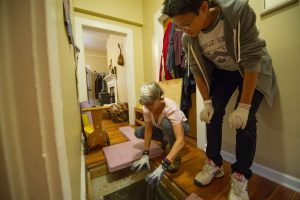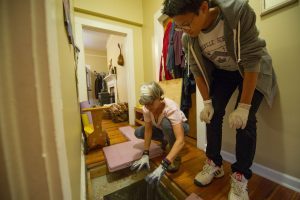Some low-income families in Buncombe County will begin receiving free energy-efficiency upgrades to their homes this month through a new county-funded Green Built Alliance program intended to help people in need save energy and reduce bills as winter approaches.
Supported by $25,000 in funding from Buncombe County, the Buncombe Energy Savers project will be administered by the nonprofit Green Built Alliance and the volunteer-based organization Energy Savers Network starting in November and continuing throughout 2018.

“Buncombe County is excited to partner with the Green Built Alliance on this initiative,” Buncombe County Sustainability Officer Jeremiah LeRoy said. “Energy Savers Network is an innovative model that provides cost-effective energy efficiency upgrades that can save citizens money on their bills, reduce dependence on public subsidies and make homes more comfortable. They can also help us reach our broader community goal of reducing peak demand as we begin to enter the cold winter months when energy use spikes in the County.”
The project aims to help low-income families save energy and lower their bills, while also providing real-world validation of the upgrade measures that can have the biggest impact on our climate by increasing efficiency and reducing demand.
Energy Savers Network was established in Asheville in 2016 as an outgrowth of the volunteer-based program that its executive director, Brad Rouse, had started a few years prior while living in Clay County in Western North Carolina.
“I have long been deeply concerned about climate change, and I find that many people share my concern but just don’t know what they can do,” Rouse said. “Most of what is being done about climate is around efforts to either change government policy or do your own thing like solar, weatherize your home, plant a garden, drive less, et cetera. What we offer is something that a person can do for others, here in Buncombe County, that would be embraced by all sides of the political spectrum, and that has a real immediate benefit for people and for the world we live in.”
While Energy Savers Network’s team of volunteers has already been offering these home upgrades to Asheville-area families on a limited basis for the past year, the Buncombe County funding is allowing these efforts to expand significantly.
After receiving an energy assessment to identify areas for improvements, affected homes will benefit from basic efficiency upgrades such as air sealing, duct repair, insulation, LED bulbs, and door and window weatherization. Participating families will also receive education on conservation behaviors.
Low-income families receiving support will be identified primarily through referrals by local nonprofits including Eblen Charities, Asheville Buncombe Community Christian Ministry, OnTrack WNC, Mountain Housing Opportunities as well as area churches, and secondarily through potential outreach events. Priority will be given to families who currently received LIHEAP subsidies for home-heating assistance.
Though volunteers perform the bulk of the home improvements through Energy Savers Network’s model, the county money will fund supplies and staff time in volunteer recruitment, training and coordination.
The project will also improve cooperation and coordination among participating organizations, increasing their capacity to offer these upgrades and growing the team of volunteers trained to complete the work.
Founded in 2001 as the WNC Green Building Council, the nonprofit Green Built Alliance is supporting the growth of Energy Savers Network as its fiscal sponsor. Both that relationship and this new community project emerged from the work of the local Energy Innovation Task Force (EITF).
“This effort is a chance to put into action the intentions of the EITF,” Green Built Alliance Executive Director Sam Ruark-Eastes said. “The goals of reducing energy demand and moving us to a clean energy future are addressed by retrofitting homes that have the highest energy and utility bill burden. We are excited for this partnership between local government and nonprofits to save energy, cut costs, and reduce the environmental harm of using fossil fuel power.”
The EITF includes representatives from the city, county, Duke Energy Progress, regional nonprofits and the local business community, who have been meeting since early 2016. Over the past year and a half, this advisory group has been focused on developing programs such as this to support its larger goals of transitioning the region to a clean energy future and averting the need for Duke’s creation of a new gas peaker plant in the coming years.
“There are other exciting projects on the horizon for the EITF,” Ruark-Eastes said. “In early 2018, we will be launching a campaign to encourage everyone in Western North Carolina to improve their homes and this community through energy efficiency, renewables and storage.”
The public is invited to attend the EITF’s regular meetings from 10 a.m. to noon on the second Friday of every month in the Buncombe County County Board Room at 200 College Street in downtown Asheville.
For information about Energy Savers Network, visit energysaversnetwork.org. To get involved in the Buncombe Energy Savers Project as a volunteer, donor or beneficiary, email info@energysaversnetwork.org.
Click here to view WLOS’ coverage of the Buncombe Energy Savers Project.


